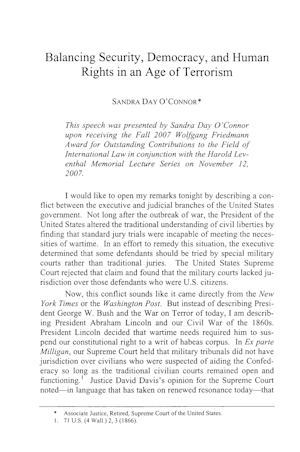By Justice Sandra Day O'Connor
Balancing Security, Democracy, and Human Rights in an Age of Terrorism
November 12, 2007

Transcript
(Excerpt)
Balancing Security, Democracy, and Human Rights in an Age of Terrorism
SANDRA DAY O'CONNOR*
This speech was presented by Sandra Day O'Connor upon receiving the Fall 2007 Wolfgang Friedmann Award for Outstanding Contributions to the Field of International Law in conjunction with the Harold Leventhal Memorial Lecture Series on November 12, 2007.
I would like to open my remarks tonight by describing a conflict between the executive and judicial branches of the United States government. Not long after the outbreak of war, the President of the United States altered the traditional understanding of civil liberties by finding that standard jury trials were incapable of meeting the necessities of wartime. In an effort to remedy this situation, the executive determined that some defendants should be tried by special military courts rather than traditional juries. The United States Supreme Court rejected that claim and found that the military courts lacked jurisdiction over those defendants who were U.S. citizens.
Now, this conflict sounds like it came directly from the New York Times or the Washington Post.But instead of describing President George W. Bush and the War on Terror of today, I am describing President Abraham Lincoln and our Civil War of the 1860s. President Lincoln decided that wartime needs required him to suspend our constitutional right to a writ of habeas corpus. In Ex parte Milligan,our Supreme Court held that military tribunals did not have jurisdiction over civilians
